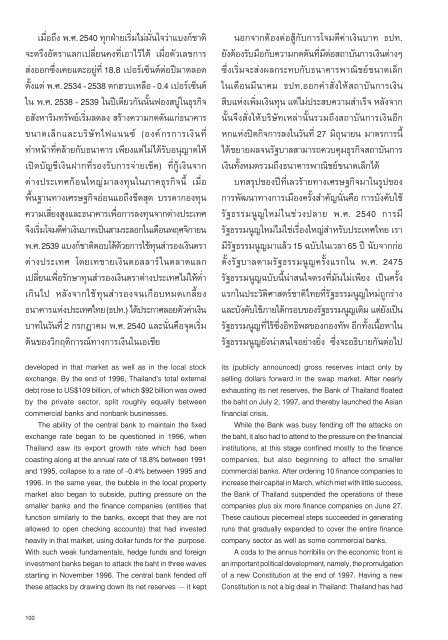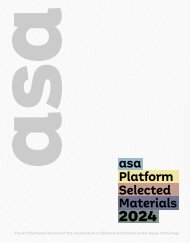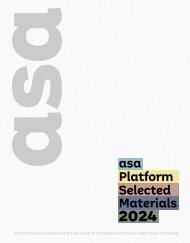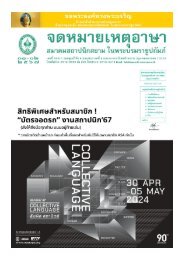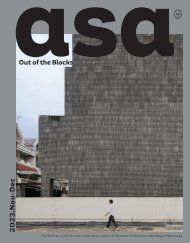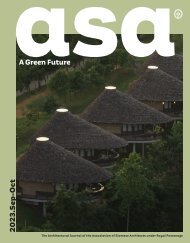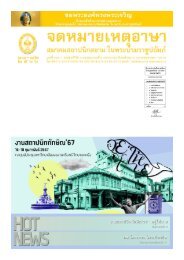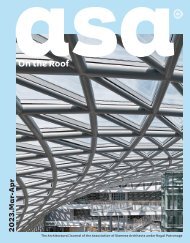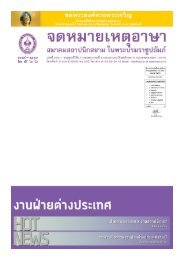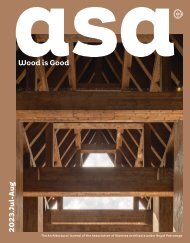บ้านเรือนถิ่นไทยในช่วงเจ็ดทศวรรษ 2489-2559
You also want an ePaper? Increase the reach of your titles
YUMPU automatically turns print PDFs into web optimized ePapers that Google loves.
เมื่อถึง พ.ศ. 2540 ทุกฝ่ายเริ่มไม่มั่นใจว่าแบงก์ชาติ<br />
จะตรึงอัตราแลกเปลี่ยนคงที่เอาไว้ได้ เมื่อตัวเลขการ<br />
ส่งออกซึ่งเคยแตะอยู่ที่ 18.8 เปอร์เซ็นต์ต่อปีมาตลอด<br />
ตั้งแต่ พ.ศ. 2534 - 2538 ตกฮวบเหลือ - 0.4 เปอร์เซ็นต์<br />
ใน พ.ศ. 2538 - 2539 ในปีเดียวกันนั้นฟองสบู่ในธุรกิจ<br />
อสังหาริมทรัพย์เริ่มลดลง สร้างความกดดันแก่ธนาคาร<br />
ขนาดเล็กและบริษัทไฟแนนซ์ (องค์กรการเงินที่<br />
ทำหน้าที่คล้ายกับธนาคาร เพียงแต่ไม่ได้รับอนุญาตให้<br />
เปิดบัญชีเงินฝากที่รองรับการจ่ายเช็ค) ที่กู้เงินจาก<br />
ต่างประเทศก้อนใหญ่มาลงทุนในภาคธุรกิจนี้ เมื่อ<br />
พื้นฐานทางเศรษฐกิจอ่อนแอถึงขีดสุด บรรดากองทุน<br />
ความเสี่ยงสูงและธนาคารเพื่อการลงทุนจากต่างประเทศ<br />
จึงเริ่มโจมตีค่าเงินบาทเป็นสามระลอกในเดือนพฤศจิกายน<br />
พ.ศ. 2539 แบงก์ชาติตอบโต้ด้วยการใช้ทุนส ำรองเงินตรา<br />
ต่างประเทศ โดยเทขายเงินดอลลาร์ในตลาดแลก<br />
เปลี่ยนเพื่อรักษาทุนสำรองเงินตราต่างประเทศไม่ให้ต่ำ<br />
เกินไป หลังจากใช้ทุนสำรองจนเกือบหมดเกลี้ยง<br />
ธนาคารแห่งประเทศไทย (ธปท.) ได้ประกาศลอยตัวค่าเงิน<br />
บาทในวันที่2 กรกฎาคม พ.ศ. 2540 และนั่นคือจุดเริ่ม<br />
ต้นของวิกฤติการณ์ทางการเงินในเอเชีย<br />
developed in that market as well as in the local stock<br />
exchange. By the end of 1996, Thailand’s total external<br />
debt rose to US$109 billion, of which $92 billion was owed<br />
by the private sector, split roughly equally between<br />
commercial banks and nonbank businesses.<br />
The ability of the central bank to maintain the fixed<br />
exchange rate began to be questioned in 1996, when<br />
Thailand saw its export growth rate which had been<br />
coasting along at the annual rate of 18.8% between 1991<br />
and 1995, collapse to a rate of -0.4% between 1995 and<br />
1996. In the same year, the bubble in the local property<br />
market also began to subside, putting pressure on the<br />
smaller banks and the finance companies (entities that<br />
function similarly to the banks, except that they are not<br />
allowed to open checking accounts) that had invested<br />
heavily in that market, using dollar funds for the purpose.<br />
With such weak fundamentals, hedge funds and foreign<br />
investment banks began to attack the baht in three waves<br />
starting in November 1996. The central bank fended off<br />
these attacks by drawing down its net reserves – it kept<br />
นอกจากต้องต่อสู้กับการโจมตีค่าเงินบาท ธปท.<br />
ยังต้องรับมือกับความกดดันที่มีต่อสถาบันการเงินต่างๆ<br />
ซึ่งเริ่มจะส่งผลกระทบกับธนาคารพาณิชย์ขนาดเล็ก<br />
ในเดือนมีนาคม ธปท.ออกคำสั่งให้สถาบันการเงิน<br />
สิบแห่งเพิ่มเงินทุน แต่ไม่ประสบความสำเร็จ หลังจาก<br />
นั้นจึงสั่งให้บริษัทเหล่านั้นรวมถึงสถาบันการเงินอีก<br />
หกแห่งปิดกิจการลงในวันที่ 27 มิถุนายน มาตรการนี้<br />
ได้ขยายผลจนรัฐบาลสามารถควบคุมธุรกิจสถาบันการ<br />
เงินทั้งหมดรวมถึงธนาคารพาณิชย์ขนาดเล็กได้<br />
บทสรุปของปีที่เลวร้ายทางเศรษฐกิจมาในรูปของ<br />
การพัฒนาทางการเมืองครั้งสำคัญนั่นคือ การบังคับใช้<br />
รัฐธรรมนูญใหม่ในช่วงปลาย พ.ศ. 2540 การมี<br />
รัฐธรรมนูญใหม่ไม่ใช่เรื่องใหญ่สำหรับประเทศไทย เรา<br />
มีรัฐธรรมนูญมาแล้ว 15 ฉบับในเวลา 65 ปี นับจากก่อ<br />
ตั้งรัฐบาลตามรัฐธรรมนูญครั้งแรกใน พ.ศ. 2475<br />
รัฐธรรมนูญฉบับนี้น่าสนใจตรงที่มันไม่เพียง เป็นครั้ง<br />
แรกในประวัติศาสตร์ชาติไทยที่รัฐธรรมนูญใหม่ถูกร่าง<br />
และบังคับใช้ภายใต้กรอบของรัฐธรรมนูญเดิม แต่ยังเป็น<br />
รัฐธรรมนูญที่ไร้ซึ่งอิทธิพลของกองทัพ อีกทั้งเนื้อหาใน<br />
รัฐธรรมนูญยังน่าสนใจอย่างยิ่ง ซึ่งจะอธิบายกันต่อไป<br />
its (publicly announced) gross reserves intact only by<br />
selling dollars forward in the swap market. After nearly<br />
exhausting its net reserves, the Bank of Thailand floated<br />
the baht on July 2, 1997, and thereby launched the Asian<br />
financial crisis.<br />
While the Bank was busy fending off the attacks on<br />
the baht, it also had to attend to the pressure on the financial<br />
institutions, at this stage confined mostly to the finance<br />
companies, but also beginning to affect the smaller<br />
commercial banks. After ordering 10 finance companies to<br />
increase their capital in March, which met with little success,<br />
the Bank of Thailand suspended the operations of these<br />
companies plus six more finance companies on June 27.<br />
These cautious piecemeal steps succeeded in generating<br />
runs that gradually expanded to cover the entire finance<br />
company sector as well as some commercial banks.<br />
A coda to the annus horribilis on the economic front is<br />
an important political development, namely, the promulgation<br />
of a new Constitution at the end of 1997. Having a new<br />
Constitution is not a big deal in Thailand: Thailand has had<br />
100


